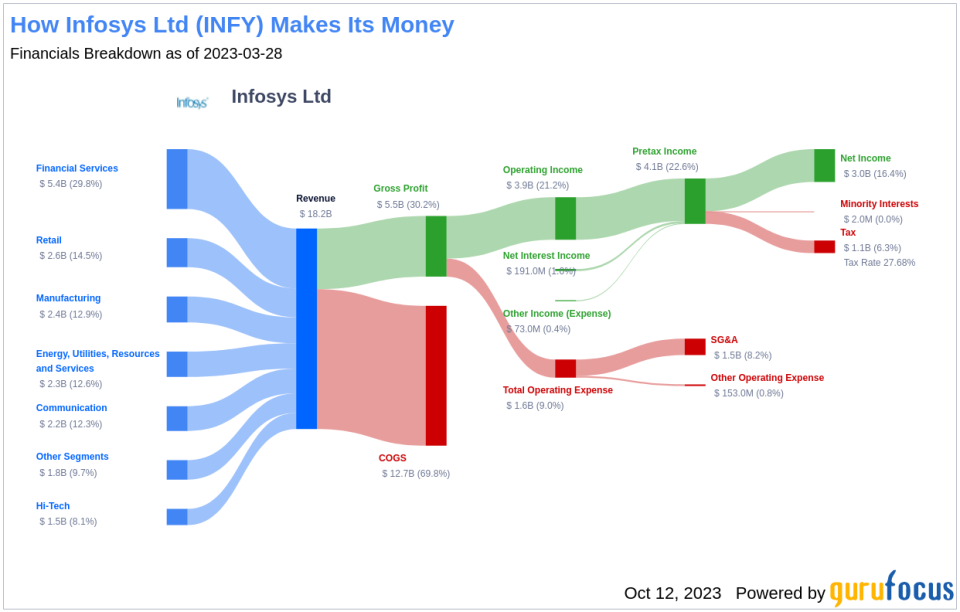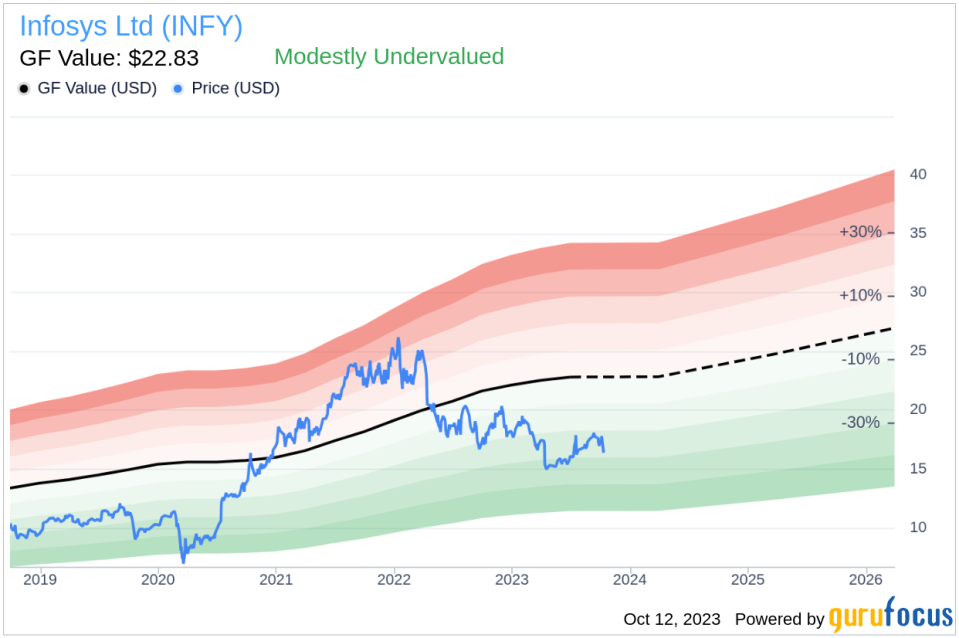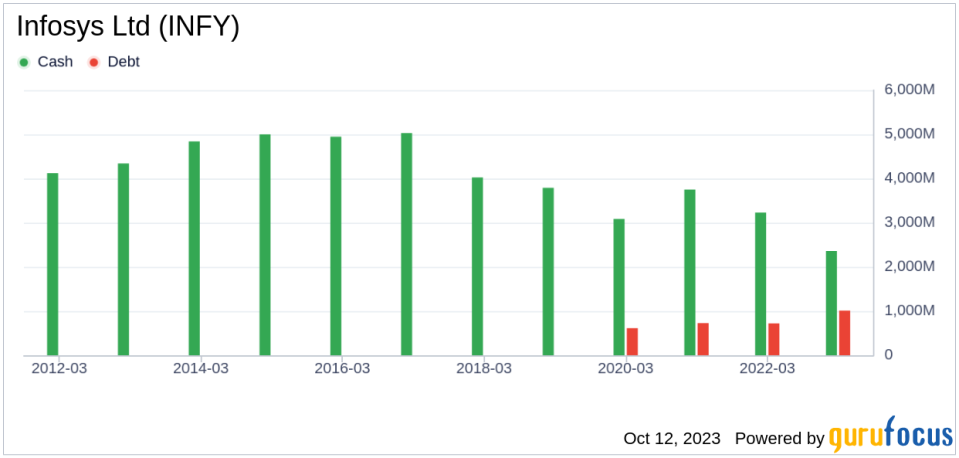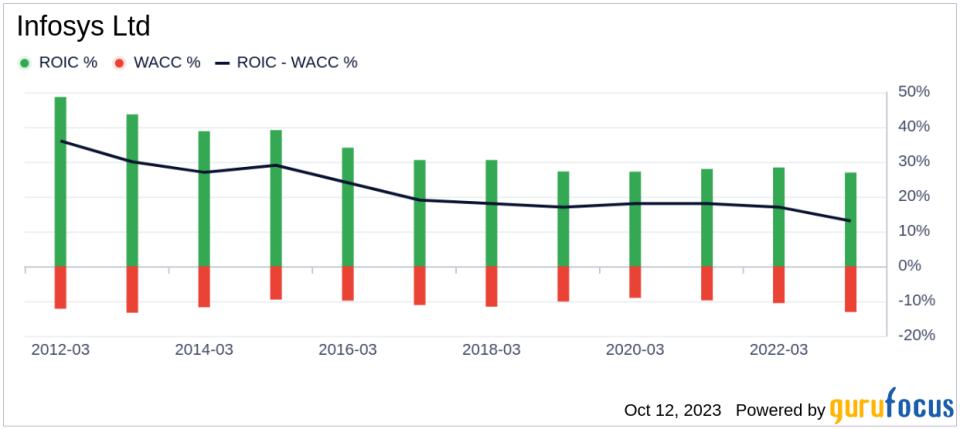Unveiling Infosys (INFY)'s Value: Is It Really Priced Right? A Comprehensive Guide
Infosys Ltd (NYSE:INFY), a leading global IT services provider, has seen its stock price fluctuate. On October 12, 2023, the stock experienced a daily loss of 7.07%, contrasting with a 3-month gain of 1.62%. Despite these fluctuations, the company's Earnings Per Share (EPS) stands at 0.72. The question arises: is the stock modestly undervalued? This article dissects Infosys' valuation, encouraging readers to delve into the analysis to make informed investment decisions.
Company Overview
Infosys (NYSE:INFY), with nearly 250,000 employees, is a global IT services provider based in Bangalore. Leveraging its offshore outsourcing model, the company derives 60% of its revenue from North America. Its offerings span traditional IT services: consulting, managed services, cloud infrastructure services, and business process outsourcing as a service (BPaaS). With a current stock price of $16.37 per share and a market cap of $69 billion, the company's value needs to be compared with its GF Value to determine if it is trading at a fair value.
Understanding GF Value
The GF Value is a proprietary measure that represents the current intrinsic value of a stock. It is computed based on historical trading multiples, a GuruFocus adjustment factor based on past returns and growth, and future business performance estimates. The GF Value Line provides an overview of the fair value at which the stock should ideally be traded. If the stock price is significantly above the GF Value Line, it is overvalued and its future return is likely to be poor. Conversely, if it is significantly below the GF Value Line, its future return will likely be higher.
Infosys (NYSE:INFY) stock is estimated to be modestly undervalued based on the GF Value calculation. Because Infosys is relatively undervalued, the long-term return of its stock is likely to be higher than its business growth.
Link: These companies may deliver higher future returns at reduced risk.
Financial Strength
Companies with poor financial strength pose a high risk of permanent capital loss. To avoid this, investors must review a company's financial strength before purchasing shares. Both the cash-to-debt ratio and interest coverage of a company are great ways to understand its financial strength. Infosys has a cash-to-debt ratio of 2.2, which ranks worse than 52.62% of 2727 companies in the Software industry. However, the overall financial strength of Infosys is 9 out of 10, indicating strong financial health.
Profitability and Growth
Investing in profitable companies, especially those with consistent profitability over the long term, is less risky. A company with high profit margins is usually a safer investment than those with low profit margins. Infosys has been profitable 10 over the past 10 years. Over the past twelve months, the company had a revenue of $18.40 billion and Earnings Per Share (EPS) of $0.72. Its operating margin is 21.39%, which ranks better than 90.29% of 2759 companies in the Software industry. Overall, the profitability of Infosys is ranked 10 out of 10, indicating strong profitability.
Growth is one of the most important factors in the valuation of a company. If a company's business is growing, it usually creates value for its shareholders, especially if the growth is profitable. Conversely, if a company's revenue and earnings are declining, the value of the company will decrease. Infosys's 3-year average revenue growth rate is better than 69.28% of 2396 companies in the Software industry. Infosys's 3-year average EBITDA growth rate is 14.3%, which ranks better than 58.81% of 1986 companies in the Software industry.
ROIC vs WACC
One can also evaluate a company's profitability by comparing its return on invested capital (ROIC) to its weighted average cost of capital (WACC). Return on invested capital (ROIC) measures how well a company generates cash flow relative to the capital it has invested in its business. The weighted average cost of capital (WACC) is the rate that a company is expected to pay on average to all its security holders to finance its assets. If the return on invested capital exceeds the weighted average cost of capital, the company is likely creating value for its shareholders. During the past 12 months, Infosys's ROIC is 26.9 while its WACC came in at 11.81.
Conclusion
In conclusion, the stock of Infosys (NYSE:INFY) is estimated to be modestly undervalued. The company's financial condition is strong and its profitability is strong. Its growth ranks better than 58.81% of 1986 companies in the Software industry. To learn more about Infosys stock, you can check out its 30-Year Financials here.
To find out the high quality companies that may deliver above average returns, please check out GuruFocus High Quality Low Capex Screener.
This article, generated by GuruFocus, is designed to provide general insights and is not tailored financial advice. Our commentary is rooted in historical data and analyst projections, utilizing an impartial methodology, and is not intended to serve as specific investment guidance. It does not formulate a recommendation to purchase or divest any stock and does not consider individual investment objectives or financial circumstances. Our objective is to deliver long-term, fundamental data-driven analysis. Be aware that our analysis might not incorporate the most recent, price-sensitive company announcements or qualitative information. GuruFocus holds no position in the stocks mentioned herein.
This article first appeared on GuruFocus.




